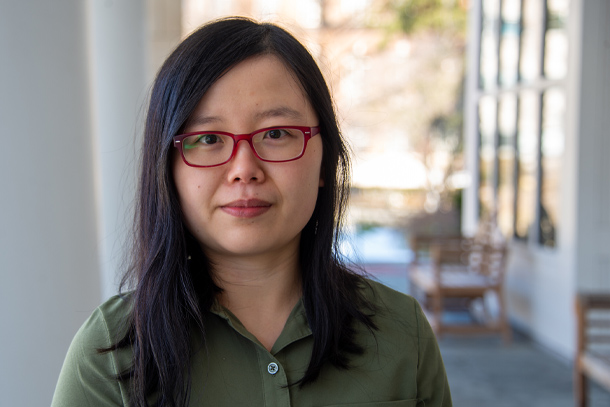
Miaomiao Jin, assistant professor of nuclear engineering in the Penn State College of Engineering. Credit: Kate Myers/Penn State
Mia Jin receives 2024 NSF CAREER Award
March 11, 2024
UNIVERSITY PARK, Pa. — Miaomiao Jin, assistant professor of nuclear engineering in the Penn State College of Engineering, earned a five-year, $550,000 U.S. National Science Foundation (NSF) Early Career Development (CAREER) Award for a project titled “Understanding the Synergistic Effects of Irradiation and Molten Salt Corrosion on NiCr Alloys.”
Q: What do you want to understand or solve through this project?
Jin: Interest in advanced nuclear reactors that rely on molten salt applications continues to grow because of their promise to be part of an energy solution to combat climate change. However, high-temperature molten salt corrosion and irradiation of structural materials is a problem for the longevity of these nuclear reactors, and a predictive capability for evaluating molten salt corrosion of structural materials under irradiation is lacking.
Using a computational perspective complemented by experimental characterization, I plan to advance the fundamental understanding of active molten salt corrosion mechanisms for nickel-based alloys and study the synergetic effects of radiation and corrosion at the alloy-salt interface.
Q: How will advances in this area impact society?
Jin: Data and methods generated from this project will benefit a broad materials-research community through data sharing. Additionally, the findings from this project will assist in strategies for corrosion control and protection, leading to the advancement of reactor designs. Molten salts research, as a whole, can be broadly applied to the energy sector.
Q: Will undergraduate or graduate students contribute to this research? How?
Jin: We hope to cultivate the next generation of professionals for the clean energy sector while raising awareness about the significance of nuclear energy and its associated challenges. Both undergraduate and graduate students will be recruited to tackle the problems using state of the art computational techniques, thereby broadening their expertise in materials science research. Additionally, this project will initiate student outreach initiatives, which will contribute to far-reaching impacts within the local communities and the public.
Q: The NSF CAREER award not only funds a research project, but it also recognizes the potential of the recipient as a researcher, educator and leader in their field. How do you hope to fulfill that potential?
Jin: As a researcher, I aim to push the boundaries of knowledge within my domain, exploring novel ideas that address pressing challenges, theoretical understanding and practical applications in nuclear materials.
As an educator, I am passionate about sharing my knowledge with a broad audience and empowering my students to become future leaders. With this leadership opportunity, I recognize the importance of fostering a collaborative and inclusive research environment, where diverse perspectives are valued. Finally, I am committed to engaging with stakeholders beyond academia, bridging the gap between research and practice to address real-world challenges.



